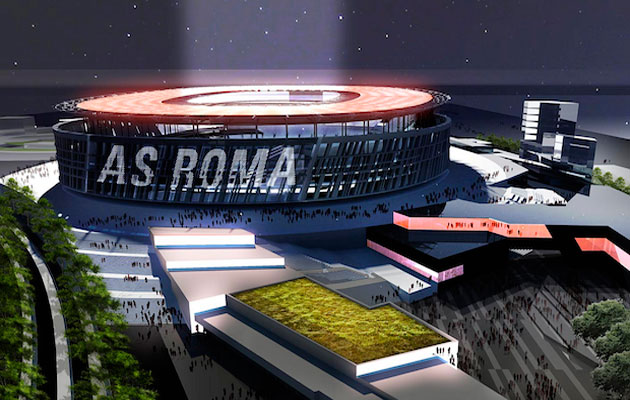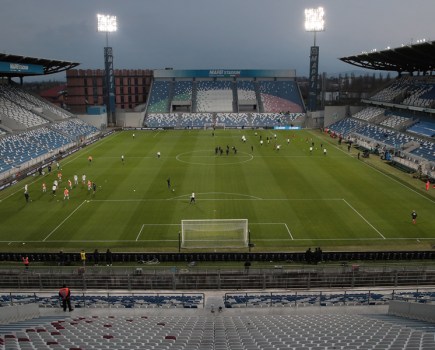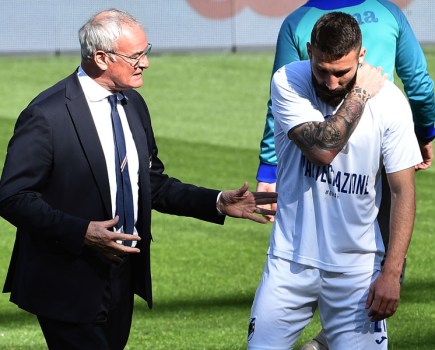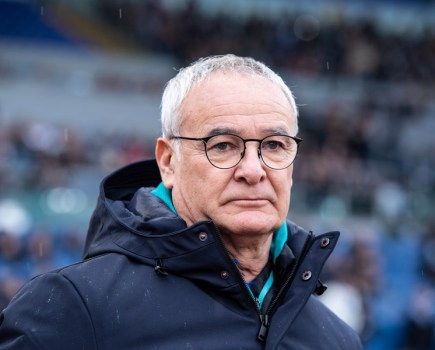Roma President James Pallotta remains upbeat and positive about the club’s long and winding road towards the construction of its own ultra modern, 52,000 seater, new stadium. Speaking at a news conference on Monday in Rome, held to coincide with the presentation of the “final dossier” re the new stadium to the city authorities, Pallotta sounded very positive.
Pointing out that people had warned him of just how difficult it would be to pull off a project like this in the complex environs of Rome, he said that things had actually gone more smoothly thus far than he had expected. However, more than two years after the project first took shape with the purchase in December 2012 of the site of the new stadium, at the old trotting racecourse of Tor Di Valle, work on the stadium and surrounds has yet to begin.
Pallotta explained that he hoped the project could overcome the final bureaucratic hurdle, namely approval from the Lazio Region, within the next six months. The complex new stadium project, which involves a variety of infrastructural developments around the whole Tor di Valle site, has already won City Hall approval.
If the Lazio region gives the go-ahead promptly, Pallotta is even hopeful that work on the site could begin before the end of the year. That in turn could mean that the new stadium would be ready for the 2017-2018 season but, at this point, the Roma President may be overly optimistic.
World Soccer asked Palotta about the sustained post-match polemic caused by a Roma fan banner on the day of Roma’s 1-0 home win over Napoli last April. Remember, the banner was critical of the mother of Ciro Esposito, the Napoli fan killed (allegedly by a Roma ultra) prior to the May 2014 Italian Cup final between Napoli and Fiorentina at the Olympic Stadium in Rome.
Pallotta had called the fans in question, “F……g Idiots”, thus taking a very clear hardline stance against the club’s ultra. Asked about the incident, Pallotta said:
“Our goal is to create a world class club with world class fans, we want it (the new stadium) to be a very secure place where you can take your kids. If there is one thing that people consistently say to me in Rome, as I meet people in the city, it is that, for some time now, they have not felt comfortable taking their children and their family to the stadium.
“For me that is completely unacceptable…Be it violence, be it racism, I just don’t feel that that sort of thing should go on at the stadium or be part of the conversation at the stadium or part of our fan base…”
We have said it before, but it is worth repeating. The way forward for Italian football, as Juventus to a large extent have already proved, comes via a new, club owned stadium. This is even more the case with both the Rome clubs, Roma and Lazio, where the new stadium might just go some way to breaking the unhealthy umbilical chord which links various neo-fascist, “ultra” elements to both clubs.
Italian coach Antonio Conte, well-satisfied with his side’s 1-1 draw away to Croatia in a behind-closed-doors euro qualifier last Friday night, is likely to field a strong side for tomorrow night’s prestige friendly against Portugal in Geneva. Conte has indicated that he wants to preserve the momentum from last Friday’s game in Split, where he felt that his side had probably deserved more than a draw.
To that end, defenders Leonardo Bonucci, Davide Astori and Mattia De Sciglio , as well as midfielders Claudio Marchisio and Marco Parolo and striker Stephan El Shaarawy, who all played against Croatia, are also likely to face Portugal. With goalkeeper Gigi Buffon and full back Lorenzo De Silvestri both ruled out by injury, however, Conte will still have room to experiment perhaps using the occasion to have another close look at midfielders such as Andrea Bertolacci (Genoa) and Roberto Soriano (Sampdoria) as well as Palermo attacking midfielder, the Italo-Argentine Franco Vazquez (Palermo)
The last mentioned Vazquez is yet another in the long and honourable line of Argentine “oriundi”, i.e. Argentines of Italian descent, to have served the Italian cause (His mother’s family comes from Padova in northern Italy). Remember, the first person to “cop” this wheeze was Il Duce, Benito Mussolini, who enrolled Argentines Orsi, Monti and Guaita to play a key role in Italy’s 1934 World Cup win on home ground.
Talking to Gazzetta Dello Sport this week, Vazquez claimed that he has always considered himself an Italian, given that his childhood summer holidays were often spent in Italy. That could well be but one is tempted to ask if the fact that Argentina can call on such as Messi, Lavezzi, Higuain, Tevez and Aguero (just to name five) might not have influenced his decision to accept the Italian “call-up” (30 minutes against England in a 1-1 friendly draw in Turin last March).
Be that as it may, Vazquez could prove a very useful addition to Italian ranks, especially if he reproduces the sort of form which saw him sparkle alongside compatriot Paolo Dybala at Palermo this season.








